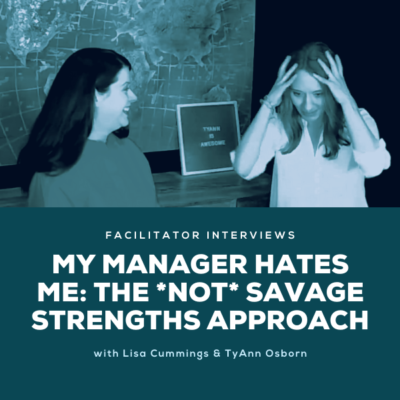My Manager Hates Me: The ‘Not Savage’ Strengths Approach
Podcast: Play in new window
Subscribe: Spotify | iHeartRadio | Email | TuneIn | More
 How Can I Turn Conflicts Around When My Manager Hates Me?
How Can I Turn Conflicts Around When My Manager Hates Me?
Certain situations can highlight the stark differences within a team, especially when your strengths seem opposite of others' strengths. For example, you might think “my manager hates me” when they seem to value other team members' ideas and blow off yours. To conform or to stay true to your natural talents becomes a tough choice to make.
When you’re the manager, it takes some skill to build a balance between honoring your team members' strengths and honoring yours, especially where you think the business priorities and values are at stake. And when you manage a team with a very different set of top 5 or top 10 strengths, how exactly do you do it?
Welcome to this episode, the first in a series with TyAnn Osborn, who role-plays and reflects with our host Lisa Cummings on the difficult scenarios where team members may have conflicting strengths. How do they handle the situation and turn conflicts around?
Here’s the transcript of the episode.
Lisa: You're listening to Lead Through Strengths, where you'll learn to apply your greatest strengths at work. I'm your host, Lisa Cummings, and you know, I'm always telling you, it's hard to find something more energizing than using your natural talents every day at work.
Well, something that's just about as energizing is when I get to hang out with the other host here in the room, TyAnn Osborn.
TyAnn: Hi!
Lisa: Today, we're going to talk about a topic that we haven't decided yet, because I am going to use this spin-the-wheel thingy thingy, to tell us.
*Spins the wheel*
TyAnn: I like the sounds.
Lisa: Oh, it says: ‘You don't like a teammate.’
When Someone On The Team Drives You Crazy
 Lisa: So today, we're going to talk about what you could do with your strengths when you don't like one of your teammates. Has this ever happened to you, Ty?
Lisa: So today, we're going to talk about what you could do with your strengths when you don't like one of your teammates. Has this ever happened to you, Ty?
TyAnn: No, I've always loved everyone that I worked with... No...[hint of sarcasm]
Lisa: But I bet one of your clients has had this situation since you've never had it, 'wink-wink...'
TyAnn: Of course, there's always someone that - for some reason - rubs you the wrong way. You just, you know, they're not your love language. And I work with clients all the time who have... there's always seems to be someone on the team who they just can't seem to get along with. Has this ever happened to you too?
Lisa: Definitely. I mean, it's funny because I feel like a big thing about me is that I love people. And I love most people.
TyAnn: Right. Me too!
Lisa: But there are people that I don't jive with as well.
TyAnn: Yeah.
Lisa: And it takes some extra effort to understand where they're coming from, or really feel like, ‘Oh, I fully get them,’ or something like that.
TyAnn: Which, you know, that's interesting when you're an individual contributor, when you feel that way, because you're like, ‘yeah, maybe that's just him’, you know. But when you're a manager, and you think, ‘Oh, I'm supposed to like everybody on the team’, or, ‘I need to not show favoritism but, eh, I kind of don't like that person. What do I do?’ It's kind of like being a parent; you're not supposed to not like one of your kids. So...
Lisa: Or not have a favorite.
TyAnn: Or not have a favorite. So, what do you do?
Lisa: Okay, so let’s do a scenario? Let's do it like, you’re a manager. It will allow us to see the perspective of the manager thinking, "Ugh, that person is high maintenance on the team." And it will allow us to explore the flip side where a team member is thinking, "Ugh, my manager hates me. What should I do?"
TyAnn: Yep.
Lisa: You happen to have done CliftonStrengths as a team.
TyAnn: Because you're a great manager.
Lisa: 'Cause you're awesome. And there is a person on your team that you appreciate as a human, but as a performer, they feel very high-maintenance to you, they drive you kind of crazy. Let's pick some talent themes that might be seemingly opposite each other so we can make it a real scenario.
TyAnn: Okay.
Lisa: Does one pop up for you as one that is least likely to be paired with another?
TyAnn: I see Deliberative being perceived as a problem child, especially when a lot of other people on the team might be more, say Activator, or something that's very forward in motion. Either Achiever, Activator, something like that. So maybe you've got a team that's like, ‘Oh, we're always ready to go!’ And there's one person who seems like they never can just get on the bus. And they're always the one dragging their heels.
Lisa: Yeah. Oh, we should do this on both directions.
TyAnn: Okay.
Lisa: Let's take Achiever-Activator.
TyAnn: Okay.
Lisa: And then let's take Deliberative. Say these are the two different people. And we can start with the manager, having Achiever-Activator, wanting stuff to get done quickly, and wanting to make decisions quickly. And the person who wants to take a little more time is the team member who reports to you, and then we’re gonna swap it.
TyAnn: Okay. Okay, I've got a real life example on that.
Lisa: Awesome. Okay.
TyAnn: Absolutely.
Lisa: So you're my manager.
TyAnn: Okay.
Lisa: You're Achiever-Activator [role play begins you can also watch the video version to get the subtleties].
TyAnn: Woohoo! Let's get going, man, come on!
Lisa: And I'm saying, "Well, bad news. I'm going to miss that deadline that you gave me."
TyAnn: Lisa, what's going on? I gave you the deadline. Come on! Chop, chop!
Lisa: Well, the thing is, I *could* get it done, but I can't get it done *properly* right now, because we don't have all of the information. I've been trying to work with this other department. They've been dragging their heels. I’m waiting for them.
If I do it now, I might just be giving you completely incorrect information because I'm seeing three or four ways this could all go wrong if I blaze ahead today, and it feels like I'm just gonna be wasting time….
TyAnn: Lisa, all I hear is excuses. I have stuff to get done too. We owe the marketing department this information. They're waiting on us to get this stuff into print. We're behind already and you know what, you're never going to have 100% confidence in what you do. So just give me something.
Lisa: Uhum...[hangs head]. Okay, now that we've come out of our characters from our roleplay, I would say, you were kind of playing like the in-between our manager where you were trying to give the people listening to the podcast, like a little bit of a glimpse of inside your head, but also be somewhat mature, like, in how you...
TyAnn: Right, right.
Lisa: ...because you're balancing the two - and that the inside voice and the outside voice are really different.
TyAnn: That’s true.
My Team Member Frustrates Me: How Can I Moderate My Message To The Person?
Lisa: Can you explain what was going on fully inside voice? Unfiltered.
TyAnn: Yeah.
Lisa: ...and then how, if you wanted to maturely talk to me, and still keep me engaged...how that might look?
Tyann: I think that's a good point because hopefully, as you progress in your career, you just don't say the first thing that pops into your head. I always say, there's the reason why there's a little space between your head and your mouth. Yeah, have a little filter in there. But inside your head, it's very normal be like,
"Oh, my God, you are so frustrating! I gave you the deadline. Arrgh, why didn't you say something sooner? You, you always do this. And all I'm hearing is excuses. Now you're throwing this other department under the bus. I cannot count on you. The rest of the team - we're getting it done. And we have to deal with the same things."
So typically, what I see when I see this combination of strengths is a lot of frustration. That is usually the emotion that I see a lot, it’s frustration. Whoever has the action, it's like, "Oh, I'm just really angry with you." And whoever's on the receiving side, well, we can debrief how you feel. But usually it's a lot of frustration on that side, too. So that's kind of what's happening inside.
And then on the outside, but I'm trying to be a good manager, and I'm trying not to just say, "Oh my God, you're such an idiot, and I hate you." 'Cause I would never say that to someone. But I'm trying to say, "You know, of course, we're never going to have 100% confidence in what we do, because that's not real life. So we have to get to a point where we may feel 80% confident, and how do we do that? And too, you can't always have an excuse for why things aren't happening. You have to take ownership of something, too."
So that's what I was trying to moderate in the message. So you could feel some of that?
Lisa: For sure. And I put you on the spot and I know this person is thinking, "I know my manager hates me, but I still don't want to deliver shoddy work."
TyAnn: Right.
Lisa: It's easier when you have time to think out the words for the feedback. It's simpler to give the vibe that, "I've been thinking about how I'm going to coach you and how we can improve this over time." What we've been doing is the in-the-moment heated feeling, "Oh, we just missed a really important deadline. You didn’t tell me. I am so upset."
Tyann: Right. And now my butt's in the sling because of you.
Lisa: Yeah. And I hear things from managers, like, "Everybody else can do it. You're the only one…" And then you don't want to give that as feedback...
 TyAnn: Right. Or you start hearing that relationship language like "always," and "never," which we say, you know, anytime you start hearing, "always," "never," that should be a clue. But when you definitely start feeling...
TyAnn: Right. Or you start hearing that relationship language like "always," and "never," which we say, you know, anytime you start hearing, "always," "never," that should be a clue. But when you definitely start feeling...
Lisa: Alarm bells.
TyAnn: Yeah, alarm bells should go off. But when you start feeling inside, like, "Oh, my God, you're always the problem. You're the problem employee. Everyone else can get it done on time, how come you can't?"
And that's when you start hearing things like, you know, "Lisa's got to go."
Lisa: Right. The employee also feels the My Manager Hates Me alarm bells.
TyAnn: Absolutely. From the manager, perspective they're already thinking of firing the person. I always call it "my employee’s broken, I want a new one" syndrome. And, you know, that might be an answer. But I don't want that to be the first answer. To me, I want that to be the last answer. And I would like to try and see, "Can this marriage be saved before we go to it's broken?"
Lisa: Yeah.
TyAnn: Because it takes a lot of effort to get another employee.
Lisa: Oh, yeah. And I have something valuable to offer you with the Deliberative talents when they're dialed in well.
TyAnn: Right. Yes. Absolutely.
Lisa: I might sit in the seat... Okay, here's what I would say, like, what would be in my head if I were this team member? I would be thinking, "Yeah, other people get it done on time. And all of my teammates, ‘always’, ‘never’... all, all my teammates, give crappy work. I'm on a team where no one cares about quality, all they care about is speed.
We do so many things three or four or five times because we were refused to do it right the first time because we won't take an extra minute to get the information from the other department, or fix that relationship that's creating the block that won't let us get the information. My manager hates me and hates my style.
"And anytime I bring up the ‘what ifs’ or ‘this might go wrong’, people treat me like I’m the negative Nellie so I just shut down and don't say anything. But it doesn't mean I want to give you bad work."
TyAnn: Mm hmm. So yeah, so you're surrounded by people that you think are...yeah...
Lisa: Half-assing it.
TyAnn: Half-assing it. And I like to say why half-ass when you can whole-ass? [smiles] Because you're right - then you're pretty probably seeing a bunch of rework that has to happen. When if we just put in the correct effort to begin with, you know, that wouldn't happen. But meanwhile, you've shut down.
Lisa: I've shut down.
TyAnn: ...because you've been shut down.
Lisa: Yes. And I might be thinking, leading through Deliberative, seeing all of the activity that is resulting in, in my opinion, bad quality work out there, now I'm thinking, "Oh, look, the whole team is running around like chickens with their head cut off. Looks totally foolish.
I'm the only one actually putting reasoning behind what we're doing. I'm the only one who's thinking I'm the only one who is bringing some rigor to this process. How is it that my manager hates me when I'm the voice of quality and avoiding a crisis that we're bound to experience if we don't pump the brakes?"
TyAnn: Right.
Lisa: And no one's valuing it. And then I'm thinking, "Well, clearly, I'm not a good fit for the job, or the company or the team, or maybe my manager. But if the whole team I perceive it like that…"
TyAnn: Yeah.
Lisa: And maybe they are like that. Or maybe they've just conformed to your behavior, because as a manager, you've been so strong in your speed.
TyAnn: Right.
Lisa: At least you're clear. So that I'm grateful for. You know, opposites.
My Manager Hates Me: Do I Conform And Please, Or Do I Look For Another Team?
TyAnn: So you said two things that were really interesting. In this scenario, you talked about this, you were waiting on something from another team, so you were the only person who brought up even an interaction with another team. So to me that says you were thinking a little more systematically and holistically. So maybe these other guys should have been interacting with this other team, and they haven't been, so there's something going on there that should be paid attention to.
But you also said something about maybe the rest of the team, they actually know things should be being done differently too, but here's what you find in a team. People want to please the manager. Because why? Because we are self-serving creatures. We do self-preservation activities, because that's what help... helps keep us alive. And at work, that's what helps keep us employed and...
Lisa: You’re writing my performance review!
TyAnn: You’re writing my review, you're helping me keep this job, you're helping me get paid more. And so it's not that there's a diabolical plot, it's just we are human beings, and we are doing these behaviors because if that's what you want for me, that's what I'm going to deliver. Even if I know there's something else that's possibly better.
Lisa: Oh, it could even be especially if. What if I think I need you to think I'm a good performer? Because if I want to change roles, because this one isn't a good fit for me, I need you to...
TyAnn: ...to support me.
Lisa: Yeah, I need your support to move into another team. And when the next manager asks how I am as a performer...
TyAnn: Right.
Lisa: ...I want you to just say how amazing I am, not that I was your highest maintenance team member, right?
TyAnn: So even if I thought you would be good for another role, they're going to say, what was Lisa's performance on your team? And I'm going to have to say Lisa was the worst performer. Who's going to want to take my lowest performer? That's going to be a much harder sell.
Lisa: Yeah.
TyAnn: And so you end up with kind of these, I always call them like aberrant behaviors. And again, not because people are diabolical, or someone sitting around trying to figure out, you know, the worst way to do things. It's just...it's self-preservation in action. And so if we don't make a conscious effort to really stop and think about things, this is what happens unintentionally.
So at the end of the day, you have good ideas, probably that aren't being heard. People are running off half-cocked. And you know, there's a bunch of rework - probably not very high quality. You know, ultimately, it's just not the best product and not the best environment, or certainly not as good as it could be something. That's what we tend to see.
Lisa: Now even though this could be a perfectly good place to end this example, let's make sure that we've flipped the scenario. Because I think it's a good example for people to experience when the same situation exists, but the themes are flipped around, because it can just change the whole scene of how the team culture looks.
You actually said you have a real example of this. So...
TyAnn: Yeah.
Lisa: Is that, is that a shareable example if it's anonymized?
Leverage Communication To Resolve StrengthsFinder Talent Theme Conflicts
 TyAnn: Absolutely. So I had this happen. And it doesn't often happen this way. But it did. And I thought it was a good story. I was working with a news crew, so the people you see on TV to put out the news. And the manager was very high Deliberative.
TyAnn: Absolutely. So I had this happen. And it doesn't often happen this way. But it did. And I thought it was a good story. I was working with a news crew, so the people you see on TV to put out the news. And the manager was very high Deliberative.
Lisa: Okay. Nice.
TyAnn: And the news people as you can imagine, very high action-oriented. I mean, and it was a newsroom. It was very much "we have to get this on the air right now." I mean, it was very high-pressured. And so Deliberative, you know, doesn't like high pressure, needs time to think, really wants to make sure that all the facts are correct, I would hate to put something out and have it be wrong.
So the manager was feeling like,
"I am working with a bunch of people who don't care about quality, are willing to be excessively risky with the reputation of our brand, because we might have to put a retraction out on the air. And that we're just going to be putting stuff out there that's half-baked, and I work with a bunch of people who I can't trust."
Meanwhile, the reporters are saying,
“Our manager is a wet blanket. Every time we take him a really cool idea, his first reaction is ‘no’, or he asks me 17,000 questions that I haven't fully thought through, I don't have the answers to. So he makes me feel stupid, or he makes me feel like, by the time I get through all of his questions, you know what, the moments passed, like, it doesn't even matter anymore. Or he'll never get back to me at all.”
And so there was this just huge conflict between them with none of them feeling valued on the team. But you know, the funny thing is, I wasn't called in because there…to do a remediation or a problem. I was called in, because they were all high performers.
That was a really interesting one to step into.
Lisa: Wow. What you're bringing up for me is this idea that it really doesn't matter what the themes are, or what the job is, because you can take any of your top CliftonStrengths talent themes, and they could be applied to serve any role. Because it's easy to get caught up in this thing, where we're like, "On this team, this group of them feels bad and this group of them feels right, or for this manager, this, this serves me, and these are not serving me.
But the reality is that our natural talents are (if we allow them to be) our easy buttons to performance."
TyAnn: Yeah.
Lisa: It's this concept of, well, maybe it's gone wild. You know, strengths gone wild. So if they could be honed in a little bit, both things that you were just bringing up in that scenario, are valuable to the organization.
TyAnn: Right.
Lisa: It's just all of them can't be on blast...
TyAnn: ...All the time.
Right. So, Lisa, you often talk about keys on a keyboard, and when we play them together, and they're harmonious, we've got some good chords going. It sounds awesome, right? And so you're right, it's not that there's good strengths and bad strengths, or that, you know, these things are naturally in conflict. It's just kind of finding that right level, because I don't think anyone would say, "Yeah, we're just gonna slap junk on the TV. And if it's not, right, well, who cares?"
I mean, no one's gonna say that, right? And no one's gonna say, "Well, we're going to chase down every possible lead until we get a 100%, you know, confidence in this. And meanwhile, it's just gonna be black on TV until we feel like we're 100% confident." Because that's not realistic, either.
So ideally, it would be great to feel like, we can work with the pace that we need to and put out really quality content that I feel good about. And in the event of an escape, you know, or a quality issue, we have a good process in place to catch that and to do whatever we need to to make a quick correction.
Lisa: Yeah.
TyAnn: And so what I got him to do was, actually, to codify his thinking process. I said, "What are the top three questions you usually ask when someone comes to you with a new idea?’ And he said, ‘Well, I just wish people had thought through things a little bit better. So I wish they would think about this, this and this." And I said, "Great, let's capture that. Let's get that out to the team so that they can do that thinking and you don't have to."
And that's it. That's easy. And I said, "How long would it take you to get back to the team then when they come to you with ideas? What...what would feel good and realistic?" And he said, "I could get back to people within 24 hours."
So okay, so we went back to the team said, "Is that a commitment that's workable for you?" So we had both sides in a satisfied position.
I wouldn't even say it's a compromise because it didn't feel like anyone was giving something up. It just felt more like communication. And so that together, we're better. And it was like a light bulb went on in terms of, now It didn't feel like I was just doing things the hard way, like it didn't feel like a struggle every day. It felt like people were almost looking for that next opportunity so that they can test the stuff out.
Find Out Where One Is Coming From And Assume Positive Intent
Lisa: Love it. So when you think about action items to give listeners, lets see what they can do with this. Maybe a person is thinking, "my manager hates me, so what are my next steps?" Or a manager is thinking, "Jim wears me out, so how can I give him a chance to show up at peak performance?"
It's too bad that this becomes a recurring theme at the office. It's the same frustration over and over again, it's just that they haven't figured out how to talk about it yet. Often they'll bring in Ty to say,
“Can you help us communicate better because we haven't been facing the tough conversation with each other - now it's messing things up."
Tyann: Right.
 Lisa: I love that there's the facilitated process that could happen. And by the way, you can bring Ty into your organization to do this, if you need help. Sometimes it just still feels awkward for you to do it because you can't be neutral like a 3rd party.
Lisa: I love that there's the facilitated process that could happen. And by the way, you can bring Ty into your organization to do this, if you need help. Sometimes it just still feels awkward for you to do it because you can't be neutral like a 3rd party.
TyAnn: I'm always happy to come in and facilitate awkward conversation [all smiles].
Lisa: You are the number one awkward conversation facilitator.
TyAnn: I could totally do that. But you can start this on your own as well.
Lisa: Yeah. I think if I were to leave any parting words for the person who's trying to do it on their own first before they blow up to the team, or before they verbalize the feedback to someone else, it would be, really get clear.
“Is it because my personal preferences are different from the business priority?”
It's personal preference, business priority, which is which? Are they not the same? And if they're not, that can be okay. You just have to get clear with yourself to go, “Ah. I get it - this is why it wraps my gut up in a knot.”
This is what I would rather it be like, but it's not like that, because it's real life.
TyAnn: Right.
Lisa: So I need to proceed like this. And then as I proceed like this with the business preference, because it's my job, it's what they're paying me for, then can I see some positive intent coming from that other person? Like, what are they actually aiming for here? Even though it's making me upset or making me feel frustrated, what are they trying to do that has good intent? Because nearly always, (sure, not always, there are nefarious characters out there somewhere), but nearly always people have good intent.
TyAnn: Yep, absolutely. That's one of my favorite things, is assume positive intent.
Because believe me, your life will be much better when you do. It's amazing how many people that I run into don't or do think someone's out there trying to get them. Believe me, the vast majority of people go to work, and they want to do a good job. So let's assume positive intent. And I think that's just when you feel yourself getting... getting anxious, or you see that team member and you can just feel yourself getting triggered, or that thing happens again, and you feel it in yourself, that's a really good moment to think, "What is it specifically that is triggering me about this?"
And again, it doesn't have to be they are an awful human being, it's just something in them is different than how you would react in that situation. So I think, stop. Think about what it is. Think about the good thing that they bring. And then again, what problem are we trying to solve? What's our ultimate goal? And how can we both get there together?
Lisa: What a perfect way to end this one.
TyAnn: Yeah.
Lisa: So next time that comes up for you, be thinking of the other person, what's the positive intent? Where are they coming from that is good and how could that, if you know CliftonStrengths talent theme language, then what are they trying to accomplish? And since you already have the talent themes in a list (or the StrengthsFinder 2.0 book), you might get some ideas about where they're coming from.
Tyann: Right.
Lisa: Because sometimes you do feel a little baffled...
TyAnn: Yeah.
Lisa: ...at the beginning, like why do they act like this, or why do they think like this, or why do they approach work like this? Or why does my manager hate me like this?
Just going to someone else's CliftonStrengths report and going, ‘Oh, they think this way, aha. This makes sense now.’
TyAnn: Reading the reports is a really good place to start.
Lisa: It's great for helping you understand the other person.
Alright, with that, you've been listening to Lead Through Strengths, where you've been learning to apply your greatest strengths, to make your work stronger, and now also looking at other people's strengths and trying to notice those so that the whole team can get better together.
Thanks, Ty.
TyAnn: Thanks, Lisa.
Hate Is Unproductive — Understand More With These Additional Resources
Whether you’re a manager or a team member, you can stop any tendency to hold a theme bias against others’ so-called “bad strengths." Listen to our conversation on that for more. Of course, most teams don't have true hate, but when a team member thinks that a leader dislikes them, their engagement and performance can take a quick nose dive.
With the premise that conflicts arise in any widely diverse work environment, Lisa and Lead Through Strengths Facilitator Strother Gaines exchange views and tips in another episode on how to Ignite Better Team Collaboration Through Strengths.
All this highlights the importance of energizing tasks at work. What can fuel or discourage best performance lies in how much CliftonStrengths talent themes are allowed and supported within the team — a challenge for some teams but highly doable.
Carmie is a professional writer and editor at Lead Through Strengths. Having spent 8 happy years with a nonprofit child organization as a storyteller and sponsorship relations team manager, she continues collaborating with others across the globe for the joy of human development and connection. Her days are powered by coffee, curiosities, cameras (film and digital), music, notebooks, and a cat. Where books are home, she’s home. She calls her Top 5 StrengthsFinder Talents “CLIPS” (Connectedness, Learner, Intellection, Positivity, and Strategic)–you know, those tiny objects that hold connected things together. She’d like to think she’s one.

